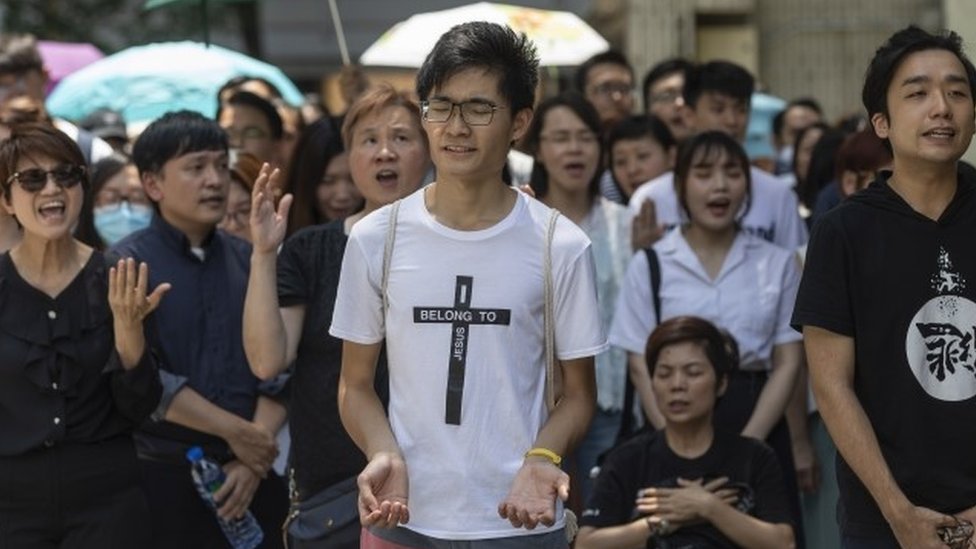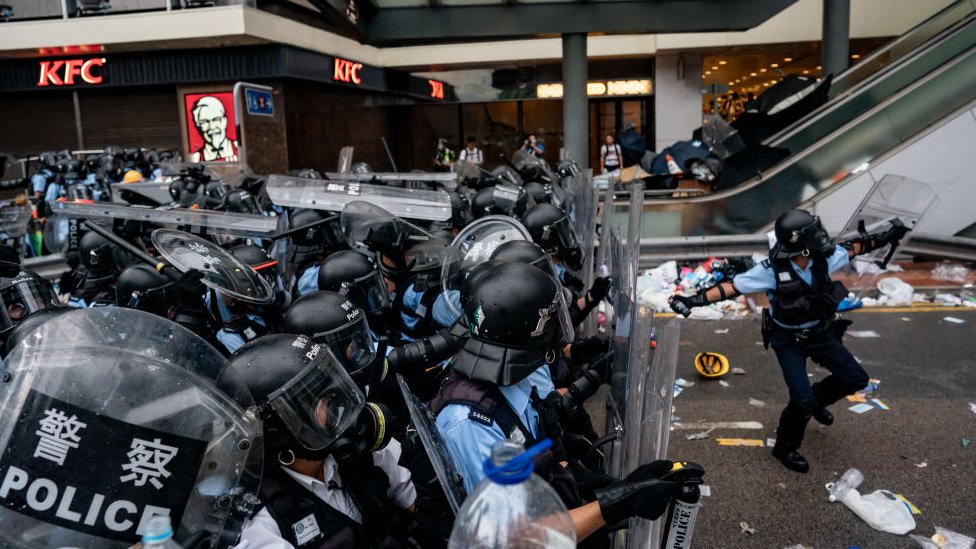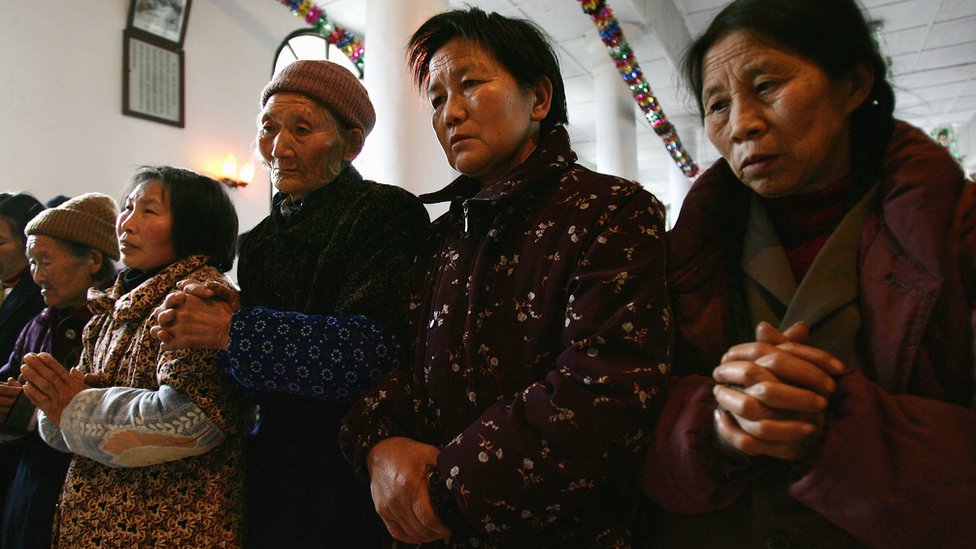- Joined
- Feb 20, 2010
- Messages
- 2,818
- Points
- 48
https://yahoo-news.com.hk/BBCChineseNews/4106/
逃犯條例修訂爭議:一首聖歌為何成為香港示威主題曲

BBC中文
2019年06月22日上午09:00

EPA在香港示威中,基督教團體起到重要作用。
在過去兩周,一首基督教聖歌出現在一個平時不可能出現的地方——逾百萬示威者佔據的香港街頭。
為抗議香港特區政府修訂允許把刑事罪嫌犯從香港引渡到大陸受審的《逃犯條例》,香港人髮起多場示威遊行。在遊行隊伍中,《唱哈利路亞讚美主》(Hallelujah to the Lord)成為示威者的非官方主題曲。
對於香港的基督徒來說,這首聖歌代表他們的信仰,但同時體現出,他們擔憂的不僅是條例通過可能帶來的政治風險,他們的宗教信仰也危在旦夕。
這首歌並非在示威初始時出現,但6月11日,在示威變向暴力的前一天,一群基督徒手持標語,在夜間集合,他們口中唱著《唱哈利路亞讚美主》。
這首聖歌迅即在其他示威者之間傳唱,很快開始在非基督教徒中傳播。
「大家唱這首歌是因為它很短,容易記住,」19歲的香港天主教大專聯會署理會長周頌天告訴BBC。「整首歌只有一句歌詞:『唱哈利路亞讚美主』。」
示威者稱,他們希望通過這首歌讓警察更加平靜,緩和緊張氣氛。

Getty Images6月12日的示威中,一名警察向群眾扔催淚瓦斯罐。
6月12日,香港爆發一場大規模的警民衝突,警方動用約150枚催淚彈、數發橡膠子彈及20發佈袋彈驅散成千上萬的示威者。香港警方和政府形容這是「有組織的暴動」。而示威者批評警方過份使用武力。
在這種情況下,這首歌的作用尤其重要。在一定程度上,這首歌還是一面政治盾牌。
「根據法律規定,所有在公共場所的宗教集會都不會被認定為違法,因此大家一起唱聖歌可以起到保護作用,保證(大家)安全,」周頌天稱。
「所以大家開始唱這首歌,用來保護自己。」周頌天稱,這首歌對基督徒來說有精神意義。
「哈利路亞這個詞本身意為讚美主,所以這(還)可以提醒香港人(主)主導著未來,」他說。
而示威中的這些宗教元素其實還有更加深遠的內涵。
香港主權在1997年移交中國,之後一直在「一國兩制」原則下享有司法獨立及自己的立法與經濟體系。
香港人擔心,一旦《逃犯條例》獲得通過,香港將會受到更多來自中國的控制。他們尤其擔心對這一條例的修訂會打擊被中國政府視作異議分子的人士。
中國在理論上尊重宗教自由,但實際上多次對一些認為威脅當局權威和國家安全的宗教及其領袖進行打擊。中國內地基督徒在壓力下必須加入政府認可的教會,這些教會的牧師也都是當局批准的,不加入這些教會的信徒會在秘密的地下教會做禮拜,但這種做法面臨被當局起訴的風險。

Getty Images中國希望國內基督徒在當局批准且可以嚴密監視的教堂內活動。
一些香港人擔憂,《逃犯條例》會被中國政府用作攻擊宗教人士及政治對手。
當BBC問周頌天香港的基督徒是否害怕時,他回答道「當然」。
「已經有一些案例,一些人將《聖經》帶到內地(最後)被捕。我們非常擔心,一旦法例通過,基督徒會受影響,我們的宗教自由會受打壓。」
香港政府已經暫停修例,但仍有許多人表示他們不見撤回條例不會罷休,繼續堅持抗議。
在本周五數千人包圍香港警察總部的示威中
,人們仍在傳唱《唱哈利路亞讚美主》。看來這首歌會與雨傘一樣,成為香港示威精神的一種象徵。
本網頁內容為BBC所提供, 內容只供參考, 用戶不得複製或轉發本網頁之內容或商標或作其它用途,並且不會獲得本網頁內容或商標的知識產權。
BBC中文
Fugitive Offenders Amendment Disputes: Why a Shrine Becomes Hong Kong Demonstration Theme Song
BBC Chinese
June 22, 2019, at 9:00 am
Christians protests against the extradition bill in Hong Kong (14 June 2019)
Christian groups played an important role in the EPA demonstrations in Hong Kong.
In the past two weeks, a Christian hymn has appeared in a place that is not always possible - the streets of Hong Kong occupied by more than one million demonstrators.
In protest against the Hong Kong SAR Government's revision of the Fugitive Offenders Ordinance, which allows for the extradition of criminal suspects from Hong Kong to the mainland, Hong Kong people launched a number of demonstrations. In the parade, "Hallelujah to the Lord" became the unofficial theme song of the demonstrators.
For Hong Kong Christians, this hymn represents their beliefs, but at the same time, they are concerned not only by the political risks that the regulations may bring, but also because their religious beliefs are at stake.
"I am from Hong Kong, not China" - the story of the Sino-Hong Kong conflict extending to the American campus
Controversy over the amendment of the Hong Kong Fugitive Offenders Ordinance: Confessions of two "reverse delivery" protesters
Hong Kong Fugitive Offenders Ordinance Amendment Disputes
About extradition: six things you need to know
Fugitive Offenders Regulations: Five issues that need to be clarified, such as "reverse delivery"
Fear and uncertainty
The song did not appear at the beginning of the demonstration, but on June 11, the day before the demonstration turned to violence, a group of Christians held slogans and gathered at night, and they sang "Singing Hallelujah to praise the Lord."
The hymn soon sang between other demonstrators and soon began to spread among non-Christians.
"Everyone sings this song because it is short and easy to remember," Zhou Yantian, the 19-year-old acting director of the Hong Kong Catholic Association, told the BBC. "The whole song has only one lyric: "Singing Hallelujah praises the Lord."
The demonstrators said they hoped that the song would calm the police and ease the tension.
A police officer throws a teargas canister during a protest on June 12, 2019 in Hong Kong China
In the demonstration of Getty Images on June 12, a police officer threw a tear gas canister at the crowd.
On June 12, a large-scale police-civilian clash broke out in Hong Kong. The police used about 150 tear gas bombs, several rubber bullets and 20 sacks to disperse thousands of demonstrators. The Hong Kong police and the government described this as an "organized riot." The demonstrators criticized the police for excessive use of force.
In this case, the role of this song is especially important. To a certain extent, this song is still a political shield.
"According to the law, all religious gatherings in public places will not be considered illegal, so everyone can sing hymns together to protect them and ensure (everyone) safety," Zhou said.
"So everyone started to sing this song to protect themselves." Zhou said that this song is of spiritual significance to Christians.
"The word Hallelujah itself means praising the Lord, so this (also) can remind Hong Kong people (the Lord) to dominate the future," he said.
These religious elements in the demonstration actually have far-reaching connotations.
Hong Kong's sovereignty was handed over to China in 1997. Since then, it has enjoyed judicial independence and its own legislative and economic system under the principle of "one country, two systems."
Hong Kong people are worried that once the Fugitive Offenders Ordinance is passed, Hong Kong will receive more control from China. They are particularly worried that the revision of this regulation will hit people who are regarded as dissidents by the Chinese government.
China respects religious freedom in theory, but in fact it has repeatedly attacked some religions and their leaders who believe that they threaten the authority of the authorities and national security. Chinese mainland Christians must join the government-approved church under pressure. The pastors of these churches are also approved by the authorities. Believers who do not join these churches will pray in secret underground churches, but this practice faces the risk of being sued by the authorities. .
Women worship at a state-sanctioned Catholic church in Sichuan (file image)
Getty Images China hopes that domestic Christians will be active in churches that are approved by the authorities and can be closely monitored.
Some Hong Kong people worry that the Fugitive Offenders Ordinance will be used by the Chinese government to attack religious figures and political opponents.
When the BBC asked Zhou Xiaotian whether Hong Kong Christians were afraid, he replied "Of course."
"There have been some cases in which some people brought the Bible to the Mainland (finally) and were arrested. We are very worried that once the law is passed, Christians will be affected and our religious freedom will be suppressed."
The Hong Kong government has suspended the amendments, but there are still many people who say they will not give up the withdrawal of the regulations and will continue to protest.
In the demonstrations of thousands of people surrounding the Hong Kong Police Headquarters this Friday
People are still singing "Singing Hallelujah to praise the Lord." It seems that this song, like an umbrella, will become a symbol of the spirit of demonstration in Hong Kong.
The content of this website is provided by BBC. The content is for reference only. Users may not copy or forward the content or trademark of this website or use it for other purposes, and will not obtain the intellectual property rights of the content or trademark of this website.
BBC Chinese
逃犯條例修訂爭議:一首聖歌為何成為香港示威主題曲

BBC中文
2019年06月22日上午09:00

EPA在香港示威中,基督教團體起到重要作用。
在過去兩周,一首基督教聖歌出現在一個平時不可能出現的地方——逾百萬示威者佔據的香港街頭。
為抗議香港特區政府修訂允許把刑事罪嫌犯從香港引渡到大陸受審的《逃犯條例》,香港人髮起多場示威遊行。在遊行隊伍中,《唱哈利路亞讚美主》(Hallelujah to the Lord)成為示威者的非官方主題曲。
對於香港的基督徒來說,這首聖歌代表他們的信仰,但同時體現出,他們擔憂的不僅是條例通過可能帶來的政治風險,他們的宗教信仰也危在旦夕。
- 「我來自香港,不是中國」——中港矛盾延燒至美國校園的故事
- 香港逃犯條例修訂爭議:兩個「反送中」抗爭者的自白
- 香港逃犯條例修訂爭議 一張圖看完全過程
- 有關引渡:你需要了解的六件大事
- 逃犯條例:「反送中」等五個還需搞明白的問題
這首歌並非在示威初始時出現,但6月11日,在示威變向暴力的前一天,一群基督徒手持標語,在夜間集合,他們口中唱著《唱哈利路亞讚美主》。
這首聖歌迅即在其他示威者之間傳唱,很快開始在非基督教徒中傳播。
「大家唱這首歌是因為它很短,容易記住,」19歲的香港天主教大專聯會署理會長周頌天告訴BBC。「整首歌只有一句歌詞:『唱哈利路亞讚美主』。」
示威者稱,他們希望通過這首歌讓警察更加平靜,緩和緊張氣氛。

Getty Images6月12日的示威中,一名警察向群眾扔催淚瓦斯罐。
6月12日,香港爆發一場大規模的警民衝突,警方動用約150枚催淚彈、數發橡膠子彈及20發佈袋彈驅散成千上萬的示威者。香港警方和政府形容這是「有組織的暴動」。而示威者批評警方過份使用武力。
在這種情況下,這首歌的作用尤其重要。在一定程度上,這首歌還是一面政治盾牌。
「根據法律規定,所有在公共場所的宗教集會都不會被認定為違法,因此大家一起唱聖歌可以起到保護作用,保證(大家)安全,」周頌天稱。
「所以大家開始唱這首歌,用來保護自己。」周頌天稱,這首歌對基督徒來說有精神意義。
「哈利路亞這個詞本身意為讚美主,所以這(還)可以提醒香港人(主)主導著未來,」他說。
而示威中的這些宗教元素其實還有更加深遠的內涵。
香港主權在1997年移交中國,之後一直在「一國兩制」原則下享有司法獨立及自己的立法與經濟體系。
香港人擔心,一旦《逃犯條例》獲得通過,香港將會受到更多來自中國的控制。他們尤其擔心對這一條例的修訂會打擊被中國政府視作異議分子的人士。
中國在理論上尊重宗教自由,但實際上多次對一些認為威脅當局權威和國家安全的宗教及其領袖進行打擊。中國內地基督徒在壓力下必須加入政府認可的教會,這些教會的牧師也都是當局批准的,不加入這些教會的信徒會在秘密的地下教會做禮拜,但這種做法面臨被當局起訴的風險。

Getty Images中國希望國內基督徒在當局批准且可以嚴密監視的教堂內活動。
一些香港人擔憂,《逃犯條例》會被中國政府用作攻擊宗教人士及政治對手。
當BBC問周頌天香港的基督徒是否害怕時,他回答道「當然」。
「已經有一些案例,一些人將《聖經》帶到內地(最後)被捕。我們非常擔心,一旦法例通過,基督徒會受影響,我們的宗教自由會受打壓。」
香港政府已經暫停修例,但仍有許多人表示他們不見撤回條例不會罷休,繼續堅持抗議。
在本周五數千人包圍香港警察總部的示威中
,人們仍在傳唱《唱哈利路亞讚美主》。看來這首歌會與雨傘一樣,成為香港示威精神的一種象徵。
本網頁內容為BBC所提供, 內容只供參考, 用戶不得複製或轉發本網頁之內容或商標或作其它用途,並且不會獲得本網頁內容或商標的知識產權。
BBC中文
Fugitive Offenders Amendment Disputes: Why a Shrine Becomes Hong Kong Demonstration Theme Song
BBC Chinese
June 22, 2019, at 9:00 am
Christians protests against the extradition bill in Hong Kong (14 June 2019)
Christian groups played an important role in the EPA demonstrations in Hong Kong.
In the past two weeks, a Christian hymn has appeared in a place that is not always possible - the streets of Hong Kong occupied by more than one million demonstrators.
In protest against the Hong Kong SAR Government's revision of the Fugitive Offenders Ordinance, which allows for the extradition of criminal suspects from Hong Kong to the mainland, Hong Kong people launched a number of demonstrations. In the parade, "Hallelujah to the Lord" became the unofficial theme song of the demonstrators.
For Hong Kong Christians, this hymn represents their beliefs, but at the same time, they are concerned not only by the political risks that the regulations may bring, but also because their religious beliefs are at stake.
"I am from Hong Kong, not China" - the story of the Sino-Hong Kong conflict extending to the American campus
Controversy over the amendment of the Hong Kong Fugitive Offenders Ordinance: Confessions of two "reverse delivery" protesters
Hong Kong Fugitive Offenders Ordinance Amendment Disputes
About extradition: six things you need to know
Fugitive Offenders Regulations: Five issues that need to be clarified, such as "reverse delivery"
Fear and uncertainty
The song did not appear at the beginning of the demonstration, but on June 11, the day before the demonstration turned to violence, a group of Christians held slogans and gathered at night, and they sang "Singing Hallelujah to praise the Lord."
The hymn soon sang between other demonstrators and soon began to spread among non-Christians.
"Everyone sings this song because it is short and easy to remember," Zhou Yantian, the 19-year-old acting director of the Hong Kong Catholic Association, told the BBC. "The whole song has only one lyric: "Singing Hallelujah praises the Lord."
The demonstrators said they hoped that the song would calm the police and ease the tension.
A police officer throws a teargas canister during a protest on June 12, 2019 in Hong Kong China
In the demonstration of Getty Images on June 12, a police officer threw a tear gas canister at the crowd.
On June 12, a large-scale police-civilian clash broke out in Hong Kong. The police used about 150 tear gas bombs, several rubber bullets and 20 sacks to disperse thousands of demonstrators. The Hong Kong police and the government described this as an "organized riot." The demonstrators criticized the police for excessive use of force.
In this case, the role of this song is especially important. To a certain extent, this song is still a political shield.
"According to the law, all religious gatherings in public places will not be considered illegal, so everyone can sing hymns together to protect them and ensure (everyone) safety," Zhou said.
"So everyone started to sing this song to protect themselves." Zhou said that this song is of spiritual significance to Christians.
"The word Hallelujah itself means praising the Lord, so this (also) can remind Hong Kong people (the Lord) to dominate the future," he said.
These religious elements in the demonstration actually have far-reaching connotations.
Hong Kong's sovereignty was handed over to China in 1997. Since then, it has enjoyed judicial independence and its own legislative and economic system under the principle of "one country, two systems."
Hong Kong people are worried that once the Fugitive Offenders Ordinance is passed, Hong Kong will receive more control from China. They are particularly worried that the revision of this regulation will hit people who are regarded as dissidents by the Chinese government.
China respects religious freedom in theory, but in fact it has repeatedly attacked some religions and their leaders who believe that they threaten the authority of the authorities and national security. Chinese mainland Christians must join the government-approved church under pressure. The pastors of these churches are also approved by the authorities. Believers who do not join these churches will pray in secret underground churches, but this practice faces the risk of being sued by the authorities. .
Women worship at a state-sanctioned Catholic church in Sichuan (file image)
Getty Images China hopes that domestic Christians will be active in churches that are approved by the authorities and can be closely monitored.
Some Hong Kong people worry that the Fugitive Offenders Ordinance will be used by the Chinese government to attack religious figures and political opponents.
When the BBC asked Zhou Xiaotian whether Hong Kong Christians were afraid, he replied "Of course."
"There have been some cases in which some people brought the Bible to the Mainland (finally) and were arrested. We are very worried that once the law is passed, Christians will be affected and our religious freedom will be suppressed."
The Hong Kong government has suspended the amendments, but there are still many people who say they will not give up the withdrawal of the regulations and will continue to protest.
In the demonstrations of thousands of people surrounding the Hong Kong Police Headquarters this Friday
People are still singing "Singing Hallelujah to praise the Lord." It seems that this song, like an umbrella, will become a symbol of the spirit of demonstration in Hong Kong.
The content of this website is provided by BBC. The content is for reference only. Users may not copy or forward the content or trademark of this website or use it for other purposes, and will not obtain the intellectual property rights of the content or trademark of this website.
BBC Chinese









